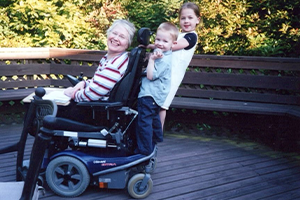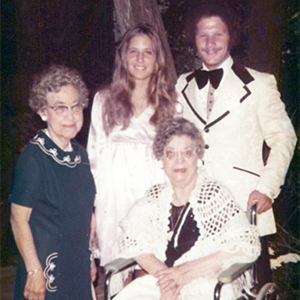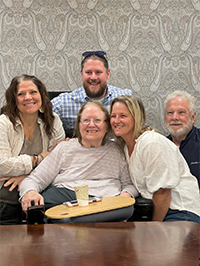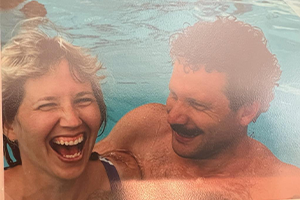Which is Worse? Living at Home with Your Husband? Or Transitioning to a Nursing Home?
At the urging of my wise and humorous husband, Lee, and to deflect or distract from minor pains or hurts, our family always played “Which is Worse?” For instance, during a boy-cousins’ sleepover with grandpa, a 9-year-old grandson can be found panicking in the bathroom nursing a bloody nose and lamenting,“Grandpa, I’m hemorrhaging!” You cuddle the victim and give needed first aid. To settle things down even more, you demonstrate and initiate a round of “Which is Worse?”
 YOU: Which hurts worse? Your bloody nose or this flip on your forehead? Which is worse, this little pinch on your thigh OR this slap on your foot? This scratch on your tummy OR this kiss on your cheek? Which hurts more? Poke #1, #2, or #3? When the absurdity of this game dawns on your subject, the time is ripe for a more thoughtful discussion about perspective. More importantly, there is
no thought of the bloody nose!
YOU: Which hurts worse? Your bloody nose or this flip on your forehead? Which is worse, this little pinch on your thigh OR this slap on your foot? This scratch on your tummy OR this kiss on your cheek? Which hurts more? Poke #1, #2, or #3? When the absurdity of this game dawns on your subject, the time is ripe for a more thoughtful discussion about perspective. More importantly, there is
no thought of the bloody nose!
 In my case this situation is happening to me in real time. First, a little background. I had my first MS symptoms in February of 1983, but doctors weren’table to give a definitive diagnosis until MRI technology was implemented after1985. We had 3 girls when diagnosed, and we were elated to welcome our son in September 1987. Women with MS tend to improve during a pregnancy, but they often have a flare-up (called an exacerbation) post-delivery. Mine hit me with a vengeance—I took on multiple symptoms in 1988, until they started subsiding eight
months after they started in February of 1988. I was exacerbating-remitting until
1997, when the illness became chronic-progressive. Which is worse? Losing part of
your vision or having to learn how to walk with altered sensation in your legs? From
1997, things really went downhill. On multiple occasions, I lowered ‘the bar’ on the
level at which I considered my quality of life compromised beyond what I could call
satisfactory. I was adapting, but not entirely happy with the changes. I tried and
heard about several therapeutic regimens, even cures. But nothing seemed to alter
the downward trajectory and decline. Even after unsuccessfully trying an injectable drug for 3 and a half years, which was finally available (when I was first diagnosed in 1988, there were no drugs that were having an impact with MS patients), I continued to decline.
In my case this situation is happening to me in real time. First, a little background. I had my first MS symptoms in February of 1983, but doctors weren’table to give a definitive diagnosis until MRI technology was implemented after1985. We had 3 girls when diagnosed, and we were elated to welcome our son in September 1987. Women with MS tend to improve during a pregnancy, but they often have a flare-up (called an exacerbation) post-delivery. Mine hit me with a vengeance—I took on multiple symptoms in 1988, until they started subsiding eight
months after they started in February of 1988. I was exacerbating-remitting until
1997, when the illness became chronic-progressive. Which is worse? Losing part of
your vision or having to learn how to walk with altered sensation in your legs? From
1997, things really went downhill. On multiple occasions, I lowered ‘the bar’ on the
level at which I considered my quality of life compromised beyond what I could call
satisfactory. I was adapting, but not entirely happy with the changes. I tried and
heard about several therapeutic regimens, even cures. But nothing seemed to alter
the downward trajectory and decline. Even after unsuccessfully trying an injectable drug for 3 and a half years, which was finally available (when I was first diagnosed in 1988, there were no drugs that were having an impact with MS patients), I continued to decline.
In 1997, I was admitted into a pre-clinical trial of stem cell transplants being done for people with auto-immune diseases, at the University of Washington, joined with Fred Hutchinson Cancer Research Institute. Finally, I found something that would disrupt the downward progression and give me hope. I had the transplant in May of 2001. It wasn't apparent in the first couple of years after the transplant that it was successful. But as years passed, each MRI showed no new lesions or active lesions and no additional scarring. And I remained stable. The problem for me is that all those previous attacks left permanent brain damage and permanent disability. But for 22 years we struggled, fought, and coped to make things work at home. While it was challenging, we made the very best of life at home, until the past year. In 2021, it slowly dawned on us that it was no longer possible for me to remain at home.
 I am now 69 years old, living in a skilled nursing home in Bountiful, UT.
I am now 69 years old, living in a skilled nursing home in Bountiful, UT.
Let’s get back to our game. Which is worse? Wearing out your family members or caregivers until they have health problems of their own OR being wise enough to know it’s OK to resign yourself to being content with less than the ideal? Which is worse? Alienating the people around you with your lousy attitude? Or facing the reality of being lonely and friendless as you age? My son called meout once by saying, “Mom, don’t you realize that you are infecting this car with your out-of-control anxiety?”
 I've been in a nursing home since March. I had all kinds of horrific pre-images and stereotypes about living in an institution. I dreaded the thought of
being away from my family. However, the reality has been quite different. I feel safe. The people who work here are compassionate and helpful. And I am NOT away from my family. I see them frequently and never in an experience where I’m worried about straining their bodies or angering their souls. Both my husband and
I are having difficulties living apart. We’ve been married nearly 50 years. We’ve had our normal struggles and challenges. One of the toughest was altering our relationship to accommodate caregiving demands. The most dramatic positive change of being in a nursing home, is that we have been able to return to being husband and wife. We are making progress in redefining our love without the complications and encumbrances of caregiving. We are both happy to leave that to the professionals.
I've been in a nursing home since March. I had all kinds of horrific pre-images and stereotypes about living in an institution. I dreaded the thought of
being away from my family. However, the reality has been quite different. I feel safe. The people who work here are compassionate and helpful. And I am NOT away from my family. I see them frequently and never in an experience where I’m worried about straining their bodies or angering their souls. Both my husband and
I are having difficulties living apart. We’ve been married nearly 50 years. We’ve had our normal struggles and challenges. One of the toughest was altering our relationship to accommodate caregiving demands. The most dramatic positive change of being in a nursing home, is that we have been able to return to being husband and wife. We are making progress in redefining our love without the complications and encumbrances of caregiving. We are both happy to leave that to the professionals.
In an upcoming essay, I'll write more about this transition and our recent decision to enter hospice. Now that’s a big change to wrap my head around!
